
“Now I understand how precious life is, and I grab whatever opportunity presents itself to me.”
He was one of the first few in Singapore to receive a kidney from a donor whose blood type did not match his own.
Thanks to the ABO blood group incompatible kidney transplant, Mr Tan Chong Neng, now 30, was given a new lease on life.
He was only 18 when he discovered he had kidney failure. Both his ankles were badly swollen then. After a urine test and prescribed medications which were ineffective, he went on dialysis for two years.
“I felt left out because all my friends went to National Service and I was exempted,” said Mr Tan.
At 21, with less than a year to graduation, the then-Temasek Polytechnic student had two options: Wait eight to nine years for a compatible donor, or opt for the relatively new ABO incompatible kidney transplant.
His mother, Mrs Tan Ah Ngoh, 64, was so insistent that he take up the transplant that she volunteered as a donor.
As they had different blood groups, the ABO incompatible transplant was done — in 2009. South-East Asia’s first such kidney transplant was performed in Singapore in 2008.
There is a higher risk of rejection associated with the transplant, said Assistant Professor Terence Kee, President of the Society of Transplantation (Singapore) and director of the renal transplant programme at Singapore General Hospital.
Without prior treatment, the recipient may experience immediate rejection of the transplanted kidney, due to the difference in blood groups.
The treatment includes removing antibodies from the blood using technologies like plasma exchange and removing the cells that Kidney transplant gives him a new lease of life produce antibodies using special drugs.
Prof Kee added that there may be a higher risk of infection and surgery- related bleeding.
As with other transplants, patients must be physically fit for surgery and receive immunosuppressive drugs that will weaken the immune system.
Thanks to his parents — Mrs Tan even took home-cooked food to the hospital — Mr Tan returned to health.
TRANSPLANT GAMES
Last Saturday, he was among 129 participants at the Singapore Transplant Games, which aims to raise awareness of the post-transplant quality of life that can be achieved.
Taking part for the third time, Mr Tan finished fourth in the men’s badminton doubles. “Now I understand how precious life is, and I grab whatever opportunity presents itself to me,” said Mr Tan, who secured a banking job half a year after graduating from SIM University with a Bachelor of Science in Business Management.
This was after rejections from employers who were not comfortable about him needing leave for regular medical check-ups.
His experience has helped him encourage others in similar situations: “Know that overcoming your challenges will lead you somewhere good. I’m a living example of that,” he said.
Contributed by














 Get it on Google Play
Get it on Google Play